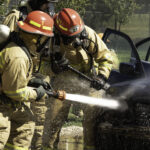\food des·ert
noun
1.an urban area in which it is difficult to buy affordable or good-quality fresh food: “many poor people live in food deserts—where they have plenty of food but none of it healthy”
(Oxford Dictionary)
Learning that Kirkwood Community College falls into this category can be a bit of a shock to some people, living in an area surrounded by fields of harvest.
It is often easy to overlook this fact if students are blessed enough to have a form of transportation and sufficient cash to travel to a grocery store or market several miles away.
However, that is not the case for many students and their families who depend on the Kirkwood Food Pantry to meet their needs for nourishment.
The American Nutrition Association defines food deserts as parts of the country lacking in adequate supply of fresh fruit, vegetables and other healthy whole foods, most notably seen in impoverished areas with a lack of transportation.
There are some considerations that can heighten difficulties experienced by a diverse population, such as the student body at Kirkwood.
• Often limited access to culturally appropriate foods.
• Increase in food sensitivities and dietary restrictions such as lactose and gluten intolerance or allergies.
• The vast price differences one faces in smaller grocery stores versus larger supermarkets can decrease the ability to afford healthier choices.
• The amount of time and travel needed to obtain and prepare quality, nutritious food which can lead to purchasing fast, available and almost always less healthy options.
Many studies have shown the detrimental effects of sustained low-quality food options are substantial. Decreased quality of diet, increased incidence of diabetes, increased BMI (Body Mass Index) and, where fruits and vegetables are priced higher, children’s weight increased over time.
Perhaps the most staggering statistic of all – $71 billion spent on chronic disease treatment could be saved simply by healthier eating, according to the National Center for Biotechnology Information.
These statistics paint a bleak future for those who find themselves in a food desert but there is hope here on the Kirkwood campus. “The reason the food pantry is important to our campus is because it provides not only traditional students but nontraditional students access to food,” explained Mialisa Wright, student support supervisor. “Sometimes they may not either have the time to grocery shop or they may be in between classes and need to stay here and study.”
The phrase of “starving student” can be a painful truth to those who have to make the tough decision to spend their resources on food or other items they need.
Wright continued, “It also helps offset costs for student who may be in between jobs who need to move their funds towards something else. Sometimes food comes as the second responsibility.”
“Maybe students don’t have transportation or funds to have transportation to get back and forth on the bus that live close to campus,” shared Wright. “It allows students in need that access to food and resources close to, hopefully, their homes in our community.”
There are food pantries located at both the Cedar Rapids and Iowa City campuses. All currently enrolled Kirkwood students are invited to receive grocery items once a week at no cost.
For those wondering how to help the pantry, they do not take donations of food. “Currently we receive 98 to 99 percent of our donations from the HACAP Food Reservoir,” stated Wright. Those wishing to support the pantry are asked to direct their donations to HACAP. More information is available at their website: https://www.hacap.org/our-initiatives/health-nutrition.
As the holiday season approaches, students might consider how they could help others. When heading to the store, consider offering a ride to another student who may have difficulties finding transportation. Or, perhaps invite a new friend to share a meal.

Categories: Campus News, Local News, News










